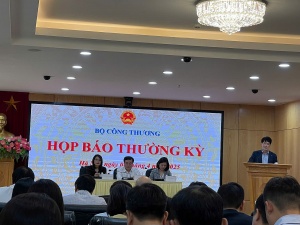CEO opinions on unexpected reciprocal US tariffs
 |
| Peter Ryder, executive chairman, Indochina Capital |
Peter Ryder, executive chairman, Indochina Capital
Real estate growth is dependent on national GDP growth. As of 2023, exports to the US accounted for nearly 30 per cent of Vietnam's GDP. Thus, if the 46 per cent US tariff on 97 per cent of Vietnam's exported goods comes into implementation, Vietnam’s GDP will be considerably affected, and this will in turn affect real estate growth.
The manufacturing sector is at the heart of Vietnam’s economy and has been primarily responsible for its impressive growth over the years. If these tariffs stand, the government’s growth target of 8 per cent in 2025 will no longer be feasible. With a depressed local, regional, and global economy, all of Vietnam’s economic sectors, including real estate, will be adversely affected.
For the industrial market, we have discussed this matter with some of our tenants at Core5 Vietnam, and all players understand the level of uncertainty surrounding this issue. This tariff will affect leasing and re-leasing at all industrial properties across the country, and foreign investors will also think twice before committing their capital to Vietnam.
While the Vietnamese government has rolled out bold and proactive policies and decisions, Deputy Prime Minister Ho Duc Phoc’s upcoming visit to the United States will be pivotal. During these negotiations with his American counterparts, Vietnam must showcase its supply chain importance to the US.
The US is a superpower with the world’s strongest economy. With such power comes great responsibility and a willingness to compromise to make the world a better place for all. Perhaps the recent positions and statements are merely a negotiation tactic, one by which the US is looking to lower its trade deficit with the rest of the world, but few of the actions of the US government make sense at this time.
Vietnam should propose urgent bilateral talks under the Vietnam – US Trade and Investment Framework Agreement, request a delay or phased implementation of the new tariffs and, at the same time, enhance incentives for American companies to invest in and trade with Vietnam.
It has also become increasingly clear that under President Trump, Vietnam must look to further diversify its trading partners. We can also work with ASEAN countries for a joint trade response to the United States, especially for highly affected industries such as textiles, footwear, furniture, electronics, and technology.
 |
| David Jackson, principal and CEO, Avison Young Vietnam |
David Jackson, principal and CEO, Avison Young Vietnam
The 46 per cent reciprocal tax policy, set to take effect on April 9, is already taking a hit on investor confidence. Global markets have reacted due to President Donald Trump’s unpredictable policies and ongoing technological changes, creating immediate uncertainty.
Vietnam will surely feel the impact of the new tariff, as US consumer behaviour remains unpredictable, influenced by political and economic reactions. This adds another layer of uncertainty for exporters. The extent of the impact will vary by industry. Sectors like motor vehicle manufacturing, wood processing, textiles and garments will possibly be hit hardest.
There are hopes that negotiations between the two countries will help alleviate the short-term pain, while the long-term impact is expected to be limited. Smart manufacturers have been adapting their contingency plans amid the increasingly uncertain global supply chain. Businesses should carefully manage stock levels and control product output to avoid disruptions, much like those seen during COVID-19 when shipping costs soared.
In the long run, businesses will continue to consider Vietnam as a destination for relocation thanks to the key advantages the country has to offer, such as affordable labour costs, a strategic location (shared border with China and access to the ASEAN market), favourable incentives, and more. Therefore, despite initial instability, Vietnam’s strategic advantages will ensure its continued strength in global trade.
Vietnam has a strong foundation for navigating trade challenges, thanks to its government’s ingenuity and strategic negotiating skills.
The country has consistently balanced relationships between Western and Eastern trade partners, ensuring it maximises the benefits of global trade agreements. A key strength lies in Vietnam’s smart diplomatic strategies. Hence, to counter obstacles like the US reciprocal tax, I believe Vietnam will continue leveraging its well-established diplomatic networks to negotiate favourable terms and exemptions where possible.
Diversifying trade partnerships has been another all-out effort by the Vietnamese government. With 12 comprehensive strategic partnerships and 17 free trade agreements in effect, Vietnam has already built a strong global trade network. To mitigate risks from over-reliance on major economies like the US and China, policymakers have further strengthened relationships with emerging markets and expanded participation in regional trade blocs. Vietnam’s success in renegotiating the Trans-Pacific Partnership after the US withdrawal demonstrates its ability to adapt and protect its trade interests.
Beyond trade agreements, Vietnam’s demographic advantage plays a significant role, with an attractive consumer market, drawing major investments from multinational manufacturers such as IKEA, Samsung, LEGO, and more. Policies that enhance workforce skills and infrastructure will further solidify Vietnam’s position as a key player in global supply chains.
While the US tariff policy introduces short-term disruptions, Vietnam’s resilient trade strategy, diplomatic expertise, and strong demographics will ensure its long-term competitiveness in the global market.
 | Financial markets tumble after Trump tariff announcement Global financial markets were rocked on Wednesday by Donald Trump's announcement of sweeping tariffs, targeting China and the European Union in particular, with the risk of undermining the international economy. |
 | Vietnam should seek dialogue to cope with reciprocal tariff policy The US' 46 per cent reciprocal tariff policy will significantly impact Vietnam’s export markets. VIR’s Bich Ngoc spoke with Vlad Savin, a partner from Acclime Vietnam, about his views on the matter. |
 | Vietnam urges US to delay tariff decision In response to the United States’ decision to impose a 46 per cent tariff on Vietnamese exports, the Ministry of Industry and Trade (MoIT) has urged Washington to delay the enforcement of the measure in the hope of finding a mutually beneficial solution through constructive dialogue. |
 | AmCham urges US to consider tariffs grace period While AmCham acknowledges the need to address the growing trade deficit between the two nations, we strongly urge the US administration to consider implementing a grace period for the just announced reciprocal tariffs on Vietnam. |
What the stars mean:
★ Poor ★ ★ Promising ★★★ Good ★★★★ Very good ★★★★★ Exceptional
 Tag:
Tag:
Related Contents
Latest News
More News
- Digital shift reshaping Vietnam’s real estate brokerages (December 31, 2025 | 18:54)
- Allen & Gledhill recognised as Outstanding M&A Advisory Firm (December 18, 2025 | 14:19)
- Inside Lego Manufacturing Vietnam (December 18, 2025 | 11:45)
- The next leap in Cloud AI (December 11, 2025 | 18:19)
- Vietnam’s telecom industry: the next stage of growth (December 11, 2025 | 18:18)
- Five tech predictions for 2026 and beyond: new era of AI (December 11, 2025 | 18:16)
- CONINCO announces new chairman and CEO (December 10, 2025 | 11:00)
- How AWS is powering the next-gen data era (December 09, 2025 | 13:14)
- Outlook in M&A solid for Singapore (December 08, 2025 | 10:31)
- Vietnamese firms are resetting their strategy for global markets (December 05, 2025 | 17:04)






















 Mobile Version
Mobile Version